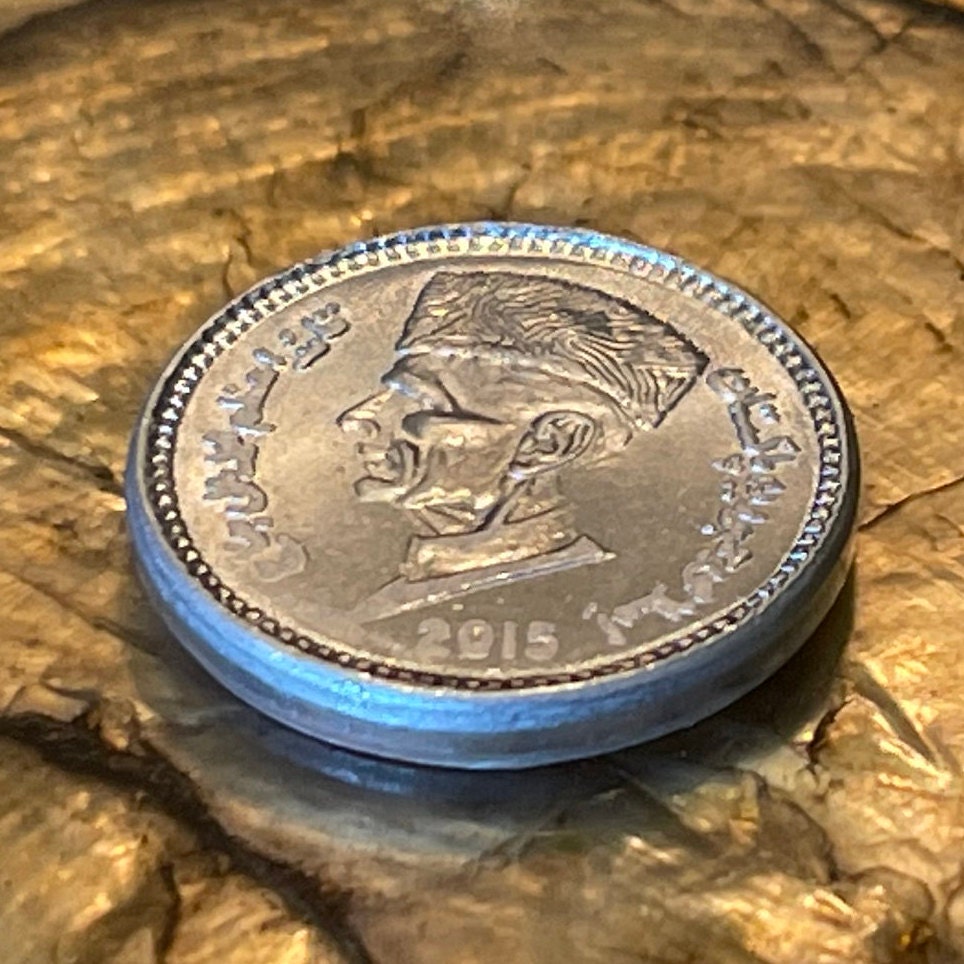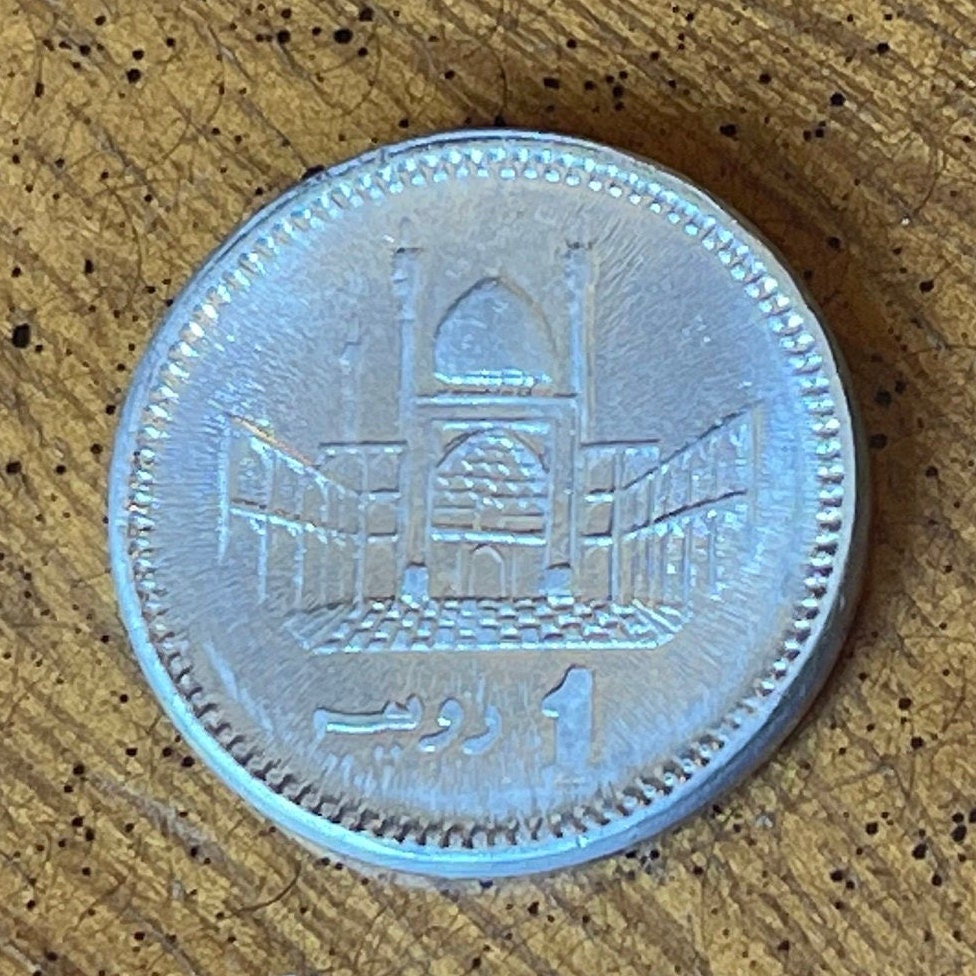elemintalshop
Mohammad Ali Jinnah & Shrine of Sufi Saint Lal Shahbaz Qalandar 1 Rupee Pakistan Authentic Coin Money for Jewelry and Craft Making
Mohammad Ali Jinnah & Shrine of Sufi Saint Lal Shahbaz Qalandar 1 Rupee Pakistan Authentic Coin Money for Jewelry and Craft Making
Couldn't load pickup availability
Mohammad Ali Jinnah & Shrine of Sufi Saint Lal Shahbaz Qalandar 1 Rupee Pakistan Authentic Coin Money for Jewelry and Craft Making
Obverse: Mohammad Ali Jinnah, facing left
Lettering:
قائد اعظم محمد علی جناح
اسلامی جمہوریۂ پاکِستان
Translation: Quaid-i-Azam (Great Leader) Muhammad Ali Jinnah
Islamic Republic of Pakistan
Reverse: Hazrat Lal Shahbaz Qalandar Shrine/Tomb, located in Sehwan Shareef (in Jamshoro District of Sindh, Pakistan)
Lettering: روپیہ 1
Translation: 1 Rupee
Features
Issuer Pakistan
Period Islamic Republic (1956-date)
Type Standard circulation coin
Years 2007-2020
Value 1 Rupee
1 PKR = USD 0.0050
Currency Rupee (decimalized, 1961-date)
Composition Aluminium
Weight 1.75 g
Diameter 20 mm
Thickness 2.6 mm
Shape Round
Technique Milled
Orientation Medal alignment ↑↑
Number N# 10739
References KM# 67, Schön# 64a
Wikipedia:
Muhammad Ali Jinnah (born Mahomedali Jinnahbhai; 25 December 1876 – 11 September 1948) was a barrister, politician and the founder of Pakistan. Jinnah served as the leader of the All-India Muslim League from 1913 until the inception of Pakistan on 14 August 1947, and then as the Dominion of Pakistan's first Governor-General until his death. He is revered in Pakistan as the Quaid-i-Azam ("Great Leader") and Baba-i-Qaum ("Father of the Nation"). His birthday is observed as a national holiday in Pakistan.
Born at Wazir Mansion in Karachi, Jinnah was trained as a barrister at Lincoln's Inn in London, England. Upon his return to British India, he enrolled at the Bombay High Court, and took an interest in national politics, which eventually replaced his legal practice. Jinnah rose to prominence in the Indian National Congress in the first two decades of the 20th century. In these early years of his political career, Jinnah advocated Hindu–Muslim unity, helping to shape the 1916 Lucknow Pact between the Congress and the All-India Muslim League, in which Jinnah had also become prominent. Jinnah became a key leader in the All-India Home Rule League, and proposed a fourteen-point constitutional reform plan to safeguard the political rights of Muslims in the Indian subcontinent. In 1920, however, Jinnah resigned from the Congress when it agreed to follow a campaign of satyagraha, which he regarded as political anarchy.
By 1940, Jinnah had come to believe that the Muslims of the subcontinent should have their own state to avoid the possible marginalised status they may gain in an independent Hindu–Muslim state. In that year, the Muslim League, led by Jinnah, passed the Lahore Resolution, demanding a separate nation for British Indian Muslims. During the Second World War, the League gained strength while leaders of the Congress were imprisoned, and in the provincial elections held shortly after the war, it won most of the seats reserved for Muslims. Ultimately, the Congress and the Muslim League could not reach a power-sharing formula that would allow the entirety of British India to be united as a single state following independence, leading all parties to agree instead to the independence of a predominantly Hindu India, and for a Muslim-majority state of Pakistan.
As the first Governor-General of Pakistan, Jinnah worked to establish the new nation's government and policies, and to aid the millions of Muslim migrants who had emigrated from neighbouring India to Pakistan after the two states' independence, personally supervising the establishment of refugee camps. Jinnah died at age 71 in September 1948, just over a year after Pakistan gained independence from the United Kingdom. He left a deep and respected legacy in Pakistan. Innumerable streets, roads and localities in the world are named after Jinnah. Several universities and public buildings in Pakistan bear Jinnah's name. According to his biographer, Stanley Wolpert, Jinnah remains Pakistan's greatest leader.
*******
Wikipedia:
Shah Hussain, born Usman Shah Marwandi and popularly known as Lal Shahbaz Qalandar (Sindhi: لعل شھباز قلندر), was a saint and poet of present-day Pakistan and Afghanistan. He is highly regarded and respected by people of all religions. He is called Lal ("ruby-colored") because of the ruby-like glow on his face/forehead and "Shahbaz" to denote a noble and divine spirit and "Qalandar" as he was a wandering spiritual man.
The shrine of Lal Shahbaz Qalandar was built by Feroz Shah Tughlaq in 1356, expanded by Mirza Jani Beg and his son Mirza Ghazi Beg of Tarkhan Dynasty, but was not completed until 1639, when Nawab Dindar Khan paved the courtyard with glazed tiles. The silver work on the gate, the balustrade around the tomb and the top of the dome was gifted by Mir Karam Ali Talpur of Talpur Dynasty. Later on the shrine was decorated with Sindhi 'kashi-tiles', mirror-work and a gold-plated door donated by the Shah of Iran, Reza Shah Pahlavi and installed by the late Prime Minister of Pakistan, Zulfikar Ali Bhutto. The inner sanctum is about 100 square yards with a silver-canopied grave in the middle, according to Nadeem Wagan, Cutharo silver donated by Sardar Mahboob Ali Khan Wagan (Chief Sardar of Wagan Tribe) on one side of the marble floor is a row of about 12-inch-high (300 mm) folding wooden stands, on which there is a set of copies of the Quran for devotees to read. On the other side, beside a bundle of incense, are rows of oil-lamps lighted by devotees. Thousands of devotees visit the tomb particularly every Thursday.
Mela / Urs (Annual Fair)
Lal Shahbaz's annual Urs (death anniversary), held on the 18 Sha'aban – the eighth month of the Muslim lunar calendar, brings more than two million pilgrims from all over Pakistan and parts of India, Bangladesh. Essentially it is a south Asian affair. On each morning of the three-day feast, the narrow lanes of Sehwan are packed with pilgrims, fakirs and devotees making their way to the shrine to commune with the saint, offer tributes and ask for their wishes. (Sao Sumar) singing from 6am till 8am the next day. They invite bands of folk-singers (mandali) from different regions each year. There have been many women who have claimed to be sexually assaulted during the overnight festivities and there have also been accusations of police indifference and coverups for such crimes.
The 2017 terrorist attack
On 16 February 2017, a group claimed responsibility for a suicide attack on the shrine which resulted in the deaths of 88 people. The following morning, the shrine's caretaker continued the daily tradition of ringing the shrine's bell at 3:30 A.M. and defiantly vowed that he would not be intimidated by the terrorists. Pakistani government and security forces have also launched a nationwide security crackdown and have recently killed 37 terrorists. The shrine's dhamaal, or meditative dancing ceremony, was resumed the very next evening following the attack.
Share



















